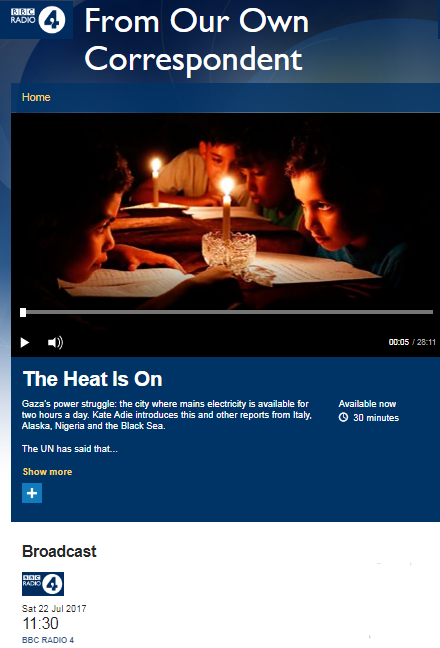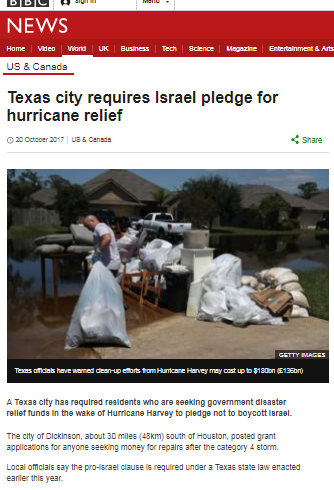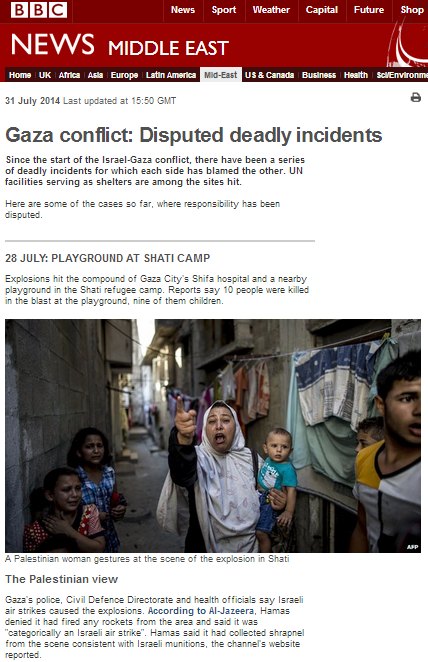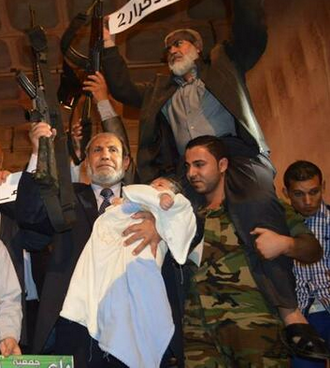The lead item in the July 22nd edition of BBC Radio 4’s ‘From Our Own Correspondent’ was introduced by presenter Kate Adie (from 00:33 here) as follows:
Adie: “Today’s headlines from the West Bank once again tell of violence. Meanwhile in Gaza the UN has warned of increasingly unlivable conditions. The narrow strip of land has long been a place of tension: tension between Israel and the Palestinians and between the Palestinians themselves. For the past ten years the Islamist group Hamas has governed there and in the summer of 2014, over 50 days of fighting with Israeli forces caused widespread death and destruction. Yolande Knell was in Gaza during that conflict and this week she’s been back.”
Yolande Knell begins her report on the beach before introducing an interviewee previously seen in one of her 2014 reports. [emphasis in italics in the original]
Knell: “Along the golden sand a few girls and boys squeal with delight as the waves lick their feet – much as on any other Mediterranean beach except that I’m in Gaza City where an energy crisis means that sewage treatment plants aren’t working properly. The sea is contaminated. It stinks. So as much as they’d love to plunge into the cool water to escape the sticky heat this summer, many families are avoiding it. ‘Gaza’s blessed with its long coast but I can’t take my children swimming’ says Naim al Khatib, a father of six whom I met 3 years ago during the last conflict between Hamas militants and Israel. Back then, Naim tried to keep up his kids’ spirits as they spent seven long weeks hiding in their apartment. Now, although everyone’s safe, he says every day remains a struggle. ‘The war’s over but the war-like situation is still going on’ he tells me. ‘The siege goes on, we’re still prisoners. The quality of life gets worse’.”
There is of course no “siege” on Gaza but Knell nevertheless chose to amplify that falsehood. She goes on, confusing Palestinian Legislative Council elections with “local elections”, giving a typically whitewashed portrayal of Hamas’ violent coup in 2007 and of course failing to mention that it is a terror organisation sworn to the destruction of Israel.
“It’s ten years since Hamas, having previously won local elections, ousted the Palestinian Authority – the PA – in Gaza and seized control of the small strip of land. In response Israel and Egypt ramped up restrictions on the flow of people and goods in and out to isolate the militant group and stop weapons reaching it. The blockade still cripples the economy. And now Gaza’s being squeezed even more as the PA – which controls only parts of the West Bank – piles pressure on Hamas to try to force it to hand back the territory.”
While the electricity crisis in the Gaza Strip was exacerbated in April when the PA declared that it would only foot part of the bill for power supplied by Israel, the dispute between Hamas and the PA on that issue actually goes back much further, originating in the PA’s levying of tax on fuel for the Gaza power plant. That part of the story was omitted from Knell’s report.
“Some of Gaza’s electricity supply comes from Israel with the PA footing the bill. But recently the Palestinian president Mahmoud Abbas asked for this to be reduced as the PA was no longer willing to provide services for Hamas. Since last month mains electricity, already limited here, comes on for just 2 to 3 hours a day. Naim shows me how he relies on a generator and even solar panels mounted by a chirping canary’s cage on his balcony. Just maintaining a water filter and refrigerator – both essentials in Gaza – takes up a lot of his time and money. Adding to the strain, like thousands of other civil servants who had continued to collect salaries from the PA even if they weren’t actually working, he’s just had his income slashed.”
As readers may recall, the PA cut the salaries of its employees who have been paid to stay at home for a decade by 30% in April. After a quote from Khatib’s daughter, Knell goes on to mention a report previously promoted in BBC content.
“But a new UN report says Gaza is increasingly unlivable for its 2 million residents and that conditions are deteriorating further and faster than previously predicted. As the population continues to grow, there’s 40% unemployment and signs of decline in education and healthcare. At the Shifa hospital an ambulance screeches past and it transports me back once again to the bloody battles and terrible destruction of 2014.”
Notably, Knell’s recollections do not include the fact that the Hamas leadership used that hospital’s staff and patients as human shields – as she well knows.
“Back then, staff here worked around the clock to treat overwhelming numbers of casualties but when I see the familiar face of Dr Ayman al Sahbani, the head of emergencies, he looks as stressed as ever. ‘Our state isn’t bad or very bad – it’s catastrophic’ he blurts out. ‘We lack essential drugs and supplies. The hospital is running on big generators and all the time I’m worried’. Dr al Sahbani explains that he depends on fuel donations and that there are no spare parts if generators break down. ‘If they stop we may lose patients in operation rooms, intensive care, kidney dialysis, the neo-natal unit’ he says breathlessly. On top of their usual work load, medics here are now also treating more sickness caused by poverty and bathing in the filthy sea. And it’s becoming more difficult to get Israeli permits to transfer seriously ill patients out of Gaza, partly because the PA is giving fewer guarantees it will cover their medical costs elsewhere. The doctor tells me how, days ago, he broke this news to the parents of a newborn with a congenital heart condition who went on to die. ‘How did I do this?’ he asks me. ‘I’m speaking to you not as a doctor but as a human being’.” [emphasis added]
BBC Watch checked Knell’s allegation that the acquisition of permits is “partly” attributable to PA policies with the body that coordinates those permits for patients from the Gaza Strip. COGAT told us that:
“To our regret, an internal Palestinian dispute harms the residents of Gaza – instead of the regime in Gaza helping them – but Israel has no connection to the issue. We would highlight that in cases in which the Palestinian Authority sends requests, and particularly those classified as urgent, COGAT coordinates the immediate passage of patients at any time of the day in order to save lives. This activity is carried out on a daily basis at the Erez Crossing, through which residents of Gaza enter Israel for medical treatment.” [emphasis added]
Moreover, while Knell does not give the name of the baby who died of congenital heart disease, she apparently did not check whether or not “Israeli permits” actually have any connection to that case. The local media recently covered three such stories.
“Earlier in the week three children under the age of 1, all suffering from heart disease, died in Gaza hospitals.
Gaza’s Hamas rulers on Tuesday blamed the Palestinian Authority for the deaths, saying that Ramallah had refused to give medical referrals for the babies to be treated in the West Bank. The PA then blamed Israel.
Dr. Bassam al-Badri, who heads the Palestinian Authority department responsible for authorizing treatment for Gazans outside of the Strip, claimed Israel had refused to grant exit permits to guardians of the children.
But the Coordinator of Government Activities in the Territories (COGAT), the Defense Ministry branch that deals with Palestinian civilian affairs, said no such request had been made.
“No request was received from the Palestinian Authority to coordinate medical treatment in Israel for the three infants,” COGAT wrote in a statement to The Times of Israel.”
Knell closes her report with opaque references to a story the BBC has so far failed to cover and listeners would hence not understand.
“On this trip I meet some Gazans clinging to rumours of political solutions involving the return of exiled figures or improved relations with Egypt. But mostly there’s just frustration and despair. And there are warnings too that troubles in Gaza will spill across its borders – and not just in terms of the sewage that’s already reaching southern Israeli beaches.”
The picture of Gaza painted by Yolande Knell in this report is of course devoid of some very important context. Nowhere in her grim portrayal does she make any mention of the fact that if it wished to do so, Hamas could solve not only the electricity crisis but numerous additional issues plaguing ordinary residents of the Gaza Strip.
“Hamas could, if it wanted to, pay for enough electricity to significantly improve power supplies. But it prefers to spend tens of millions of shekels a month digging attack tunnels into Israel and manufacturing rockets.
According to various estimates by the PA and Israel, Hamas raises NIS 100 million ($28 million) every month in taxes from the residents of Gaza. A significant part of that amount covers the wages of its members. But a large portion is diverted for military purposes. Estimates say Hamas is spending some $130 million a year on its military wing and preparations for war.”
However, the terror organisation’s prioritisation of tunnels, missiles and additional types of military build-up over the welfare of Gaza’s residents has no place in Yolande Knell’s story – just as was the case in her reporting from the Gaza Strip during the 2014 conflict.
Related Articles:
BBC WS ‘Newsday’ listeners get warped view of Gaza electricity crisis




